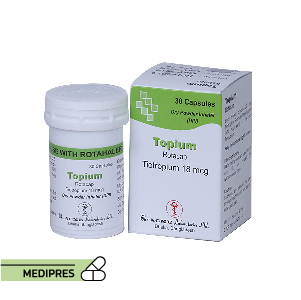
Tinidazole Tablets
23 June, 2023
Tivicay
23 June, 2023Tiotropium
Generic name: tiotropium [ tye-oh-TROE-pee-um ]
Brand names: Spiriva, Spiriva Respimat
Drug Class: Anticholinergic bronchodilators
Dosage form: Inhalation powder, Inhalation spray
Route of administration: Inhalation
Dose: Inhalation powder (Spiriva HandiHaler): 18 mcg per capsule, Inhalation spray (Spiriva Respimat): 1.25 mcg/actuation or 2.5 mcg/actuation
Mechanism of action: Tiotropium is a long-acting anticholinergic agent that selectively blocks muscarinic M3 receptors in the smooth muscle of the airways. This leads to bronchodilation by preventing acetylcholine-induced bronchoconstriction, thereby improving airflow and easing breathing in patients with obstructive lung conditions.
Drug usage cases: Tiotropium is used for long-term, once-daily maintenance treatment of chronic obstructive pulmonary disease (COPD), including chronic bronchitis and emphysema. It is also used in the management of asthma in patients 6 years of age and older as a maintenance therapy.
Drug contraindications: Contraindicated in patients with hypersensitivity to tiotropium, ipratropium, or any of its components. It should not be used for the relief of acute bronchospasm or as a rescue therapy in sudden breathing difficulties.
Side effects: Common side effects include dry mouth, sore throat, sinusitis, and cough. Serious side effects can include paradoxical bronchospasm, worsening of narrow-angle glaucoma, urinary retention, and hypersensitivity reactions.
Warnings: Caution is advised in patients with narrow-angle glaucoma, urinary retention, or renal impairment, as tiotropium may exacerbate these conditions. It should not be used for acute episodes of bronchospasm. Patients with a history of hypersensitivity to anticholinergic drugs should be monitored closely. Inhalation may cause immediate bronchospasm, and if this occurs, treatment should be stopped immediately.
Use during pregnancy or breastfeeding: Tiotropium is classified as a pregnancy category C drug. There are no adequate, well-controlled studies in pregnant women, so it should only be used if the potential benefit outweighs the risk to the fetus. It is unknown if tiotropium is excreted in human milk; therefore, caution is advised if it is administered to breastfeeding women.



